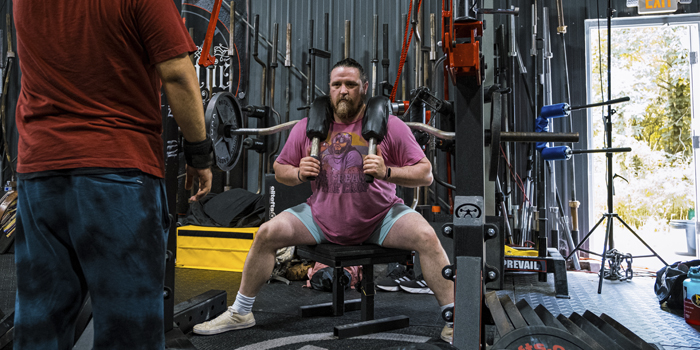
I take a very different stance when it comes to training motivation. Most people will fall back on the ever-popular concept of forcing a training session—or three or ten—when motivation is in the shitter. Some usual responses are to "suck it up and train", or to train light that day, etc. No matter the response, the vast majority of people will tell you to train, no matter what.
You only slept for three hours last night?
TRAIN.
You only had one meal all day instead of your usual five meals?
TRAIN.
Do you feel like you are coming down with something?
TRAIN.
You were doing naked cardio with your wife's BFF last night, and you are exhausted?
TRAIN (but first give me a high-five).
You just are not feeling it?
TRAIN.
For the average or newbie lifter, there may be some merit to the idea of pushing through and getting the session done, no matter what. After you gain experience (which most THINK they have, yet most do NOT have), you will be able to understand and read your body's feedback and begin to understand that some obstacles or variables are signs that skipping a training session is the better option.
The problem is you need to first get to the point where you can honestly and accurately assess feedback to know if you should train or if skipping the session is the smarter move. If you are not sure, the answer is to train and then assess how productive the session was (or was not). Over time, you will come to understand patterns. As those patterns emerge, you will begin to be able to predict whether the session will be productive or not.
To Train or Not To Train
My stance on whether to train or not is not a popular one: If in doubt, do NOT train. However, I need to elaborate on my opinion because, as with everything, someone will take it out of context. After all, this is the internet—the land of arguing over everything, whether you are considered an expert in your field by others or simply self-proclaimed. There are very clearly going to be exceptions. Still, the veteran lifter should have the ability to assess variables and have a pretty good idea—based on past experience (dare I say "patterns")—as to whether the session will be productive or not. Most of us love being in the gym, and I am one of those people. However, I am damn sure not going to go to the gym if the session is not going to be productive.
I recommend not training because if your head is not in it, you are exposing yourself to a potential injury. I do not know how many times in my almost forty years of training I had an injury (either minor or major) and told myself after the session that I KNEW I should not have trained that day. When your focus is not there—for whatever reason—things can go very wrong. If you are coming into a session with nagging pain, keep in mind that this could be the session that culminates in an injury. The signs are there, and ignoring them could cost you months of training versus taking a few days off to rest and recover.
I put the potential for injury at the top of the list, but other equally concerning variables also need to be considered.
Feeling Sick?
If you are feeling sick, training hard can compromise your immune system, and you can end up either being sick longer or getting even sicker than you are. I would much rather be sick for a day or two while resting versus continuing to train with less-than-optimal results and end up sick for a week or more. When the body is sick, the body is weak. When the body is weak, it is more vulnerable to injury. Maintaining normal strength levels when feeling sick is a very efficient opportunity to increase the risk of injury. For those in the back who may have missed it, training while you are sick can lead to injury.
Lack of Sleep or Food
Not having enough sleep or enough food is a situation that is more of a crapshoot. Sometimes, you might have a great session even though the cards seem stacked against you. Other times, your body will have less energy to train as intensely as you are accustomed to training. What can that lead to? If you have been following along, you would be correct by saying, "Injury."
Oftentimes, when you lack food or sleep, it comes down to your mental ability to stay focused and not dwell on the lack of sleep or food. I have had some incredible workouts on very little sleep and/or very little food, but I will say this: I have had far more shitty workouts than good workouts when sleep or food is considerably lower than expected. Taking the day off and training the following day is an easy way to ensure that your sleep and nutrition are maximized for a productive workout the next day. It is one day. No one is not getting huge or losing muscle in just one day. As far as I am concerned, it is a fair trade and the smarter option.
Motivation
I left motivation for last. I am talking specifically about not feeling like you want to train for no apparent reason. Your sleep is decent, your food intake is good, you are not feeling sick, and you do not have any aches or pains, but you just do not feel like training. This is where most people will tell you to suck it up and train, no matter what. The argument usually involves throwing the word "discipline" around several times and possibly even trite or vapid comments like, "Success does not come easy" or "Tren and train or die," blah, blah, blah.
RECENT: Back to the Future
I say if you do not want to train, do not train. If you do not want to train for three weeks, do not train. If you are training because you feel obligated to train and would rather be doing something else, do something else. And if you truly love to train, you will want to train. If you have the chance to do something with your friends and that is more important to you, bye Felicia—have fun. I do not give a shit if you train or not. I am not Tony Robbins; I am not holding your hand and giving you pep talks to motivate you. And I do not need to tell you, "You can do it!" (That would be Tony Little instead of Tony Robbins, but you have to be old to get the reference).
I don't need to tell you because you already know you can do it, but you're contemplating not doing it. It is not that champions force themselves to train when they do not feel like it; Champions train when they are scheduled to train because they LOVE to train. It is that simple. No champion thinks, "I would rather hang out with my girl and have a burger and a beer." Those thoughts are only from people who do not love training and those who are good with mediocre results.
Productive Training > Just Training
Getting a training session done does not and will never ensure progress. Getting a PRODUCTIVE training session done absolutely will feed progress. When you hear that consistency feeds progress over time, understand that it is the consistency of productive workouts, not just the consistency of showing up at the gym to train. One bad day can cost you months of training and progress if you end up injured. Compare that to taking one or two days off if you are not feeling it for whatever reason. Be smart and be calculated. If you do not feel like training because you are going to the county fair for elephant ears with your girlfriend, do not train. Just do not be that guy in ten years who says, "If I had stuck with training, I would be big just like you." Just Sayin.
Ken “Skip” Hill has been involved in the sport of bodybuilding for almost forty years and competing for twenty-plus years. Born and raised in Michigan, he spent 21 years calling Colorado home with his wife and their four children. Four years ago, he and his wife traded the mountains for the beach, relocating to South Florida. His primary focus is nutrition and supplementation, but he is called upon for his years of training experience, as well. He started doing online contest prep in 2001 and is considered one of the original contest prep guys (when the bodybuilding message boards were still in their infancy). Skip’s track record with competitive bodybuilders is well-respected, and he also does sport-specific conditioning, including professional athletes.











The key is to know if you are making an excuse versus prioritizing your health, life, and mental engagement with the training. The purpose of training is to improve quality of life, not to train for the sake of training. But I'm 48 and I have other shit to do. I understand Skip's perspective.